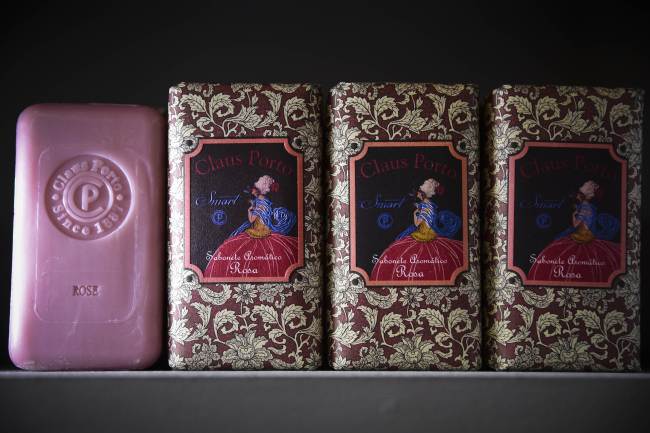LISBON (AFP) ― From vintage sardine tins and embroidered napkins to artisanal soaps, Portugal’s retro products are winning new fans as a handful of companies introduce their old-school aesthetic to the international market.
“The Americans have McDonald’s ― we’ve got tinned fish,” jokes Tiago Cabral Ferreira at the Conserveira de Lisboa shop which has sold sardines, mackerel and other canned fish from the heart of Lisbon’s old town for the past 83 years.
And it’s the retro-styled tins, with their vintage logos and slogans, that lure up to 100 a customers a day at the height of the tourist season. The shop itself offers a glimpse back to a bygone era, with its carefully preserved decor including original tiles and wooden floors.
“The Americans have McDonald’s ― we’ve got tinned fish,” jokes Tiago Cabral Ferreira at the Conserveira de Lisboa shop which has sold sardines, mackerel and other canned fish from the heart of Lisbon’s old town for the past 83 years.
And it’s the retro-styled tins, with their vintage logos and slogans, that lure up to 100 a customers a day at the height of the tourist season. The shop itself offers a glimpse back to a bygone era, with its carefully preserved decor including original tiles and wooden floors.

The fish itself ― a cupboard essential in Portugal ― has been going down a treat with tourists too thanks to a canny marketing strategy focusing on its heritage and traditional local production.
In the shop, a couple of German tourists rave about their find, insisting, there are “very rarely shops like this in Europe.”
“The Portugese are working to showcase their history, not everybody is lucky enough to know about it” one of them said.
When Catarina Portas opened her shop “A Vida Portuguesa” six years ago, she set out to promote Portugese heritage via vintage brands and products.
“I’d noticed that old Portugese brands were disappearing, and that their designs hadn’t changed for 50 or 70 years, because under Salazar’s dictatorship they didn’t have to deal with serious competition,” she says.
Understanding the appeal of these old-school labels, she stocked her shop with products boasting “over 30 years of history, with packaging that was identical, or strongly linked to the original.”
“I wanted to show that our products are good. The Portugese had a tendency to think that foreign products were better,” she says, adding that she also wanted to help promote small local brands over multinationals.
Her strategy seems to be paying off. She’s doing a roaring trade to tourists and Portugese consumers alike at her shops in Porto and Lisbon, where she sells over 2,000 vintage Portugese products, with the branch in the capital generating over a million euros in sales.
It’s a similar story at Ach Brito-Claus Porto, a soap and perfume-maker with a long history. The company launched in 1887, but 100 years later, they were struggling.
According to Aquiles Brito, a fourth-generation employee in the family business, by the ’90s the brand was suffering and the company was on the brink of collapse.
“Going against market research recommending mass distribution, we decided to bet on our old logos,” and focus on international markets, he explains.
Twenty years later, there’s no let up at the company’s small factory in Porto where employees meticulously wrap each bar of soap in beautiful Art Nouveau and Art Deco-style packaging, ready to be exported to over 50 countries around the world.
Oprah Winfrey and Kate Moss are both fans of the Claus Porto brand, and their endorsement means there’s no shortage of international fashionistas who are more than happy to pay 15 euros ($20) for a bar of soap.
“The crisis in Portugal has seen us turn towards our roots a little more each day, closer to what I call our pedigree. It’s that pedigree that our clients are looking for” Brito concludes.
-
Articles by Korea Herald








![[Graphic News] More Koreans say they plan long-distance trips this year](http://res.heraldm.com/phpwas/restmb_idxmake.php?idx=644&simg=/content/image/2024/04/17/20240417050828_0.gif&u=)
![[KH Explains] Hyundai's full hybrid edge to pay off amid slow transition to pure EVs](http://res.heraldm.com/phpwas/restmb_idxmake.php?idx=644&simg=/content/image/2024/04/18/20240418050645_0.jpg&u=20240419100350)






![[From the Scene] Monks, Buddhists hail return of remains of Buddhas](http://res.heraldm.com/phpwas/restmb_idxmake.php?idx=652&simg=/content/image/2024/04/19/20240419050617_0.jpg&u=20240419175937)

![[KH Explains] Hyundai's full hybrid edge to pay off amid slow transition to pure EVs](http://res.heraldm.com/phpwas/restmb_idxmake.php?idx=652&simg=/content/image/2024/04/18/20240418050645_0.jpg&u=20240419100350)

![[Today’s K-pop] Illit drops debut single remix](http://res.heraldm.com/phpwas/restmb_idxmake.php?idx=642&simg=/content/image/2024/04/19/20240419050612_0.jpg&u=)